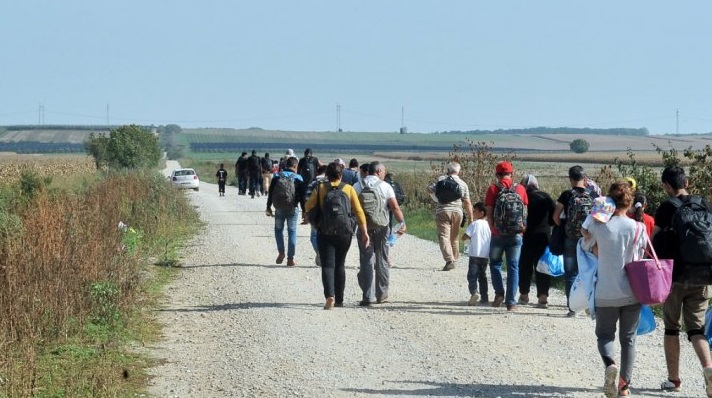The border crossing at Croatia was surprisingly tense. Bertha was searched twice by guards, one of whom seemed bewildered by our entering from Serbia, another of whom clearly mistrusted us. The officials were relatively young and very stern.
We had intended to stay at Lipovac just inside the border. However the ‘campsite’ was right alongside the motorway behind high rusty fences and without any campers. A small group of colourfully dressed and Arabic speaking women and children sat in the middle of its empty carpark.
In 48 hours’ time the news would show a mass improvised camp of thousands of people near Lipovac, having entered the country just before its borders with Serbia were closed in response to the mass of migrants trying to find a new route to Germany, and avoid being registered in Hungary.
It’s strange how simply crossing a border can fundamentally change the environment. After bumping along largely by ourselves on Serbia’s motorway, through vast arable plains of cornfields, we were now suddenly travelling in the midst of busy traffic and beside dark forested fields.
The 250mile drive along the well surfaced toll road was easy but hot in the day’s heat. For a large part of it we skirted the border with Northern Bosnia, seeing domes and minarets in villages behind the line of forest and up in the hillsides.
In some places we made out the telling markers identifying areas not cleared of land mines, and signs advising no entry. We’d seen these markers four years before when crossing Bosnia’s south coast borders with Croatia. It was a stark reminder of the wars of the 1990s.
Bertha had developed a rattle which we understood to be a bracket holding the new exhaust. We didn’t see any other campervans until we made the Zagreb ring road. Then we joined a procession of mainly German vans heading south towards the Dalmatian coast. We left them by turning into the ‘interior’ and taking the old main road to the Plitvice National Park. We both enjoyed the late afternoon light and the quiet rural road that wound gently up the rolling hillsides alongside the Korana River.

After a peaceful night in a small autokamp, with two other vans, we arrived in the national park before noon. The gigantic and busy car park was a shock to the system. It was also full, meaning we had no choice but to leave after fruitlessly waiting around for half an hour in the hope of a space. Typical of the car parks at big attractions many large motorhomes had parked across two spaces simply to gain room.
A smug Czech ‘helpfully’ advised me in German that there was no parking to which I replied in German that there were indeed spaces but the selfish parking of other campers meant they were not free. He hastened back into his van, in some surprise!

We needed a new plan so drove south through the park to a large bustling campsite where we could use a free shuttle bus back to the entrance the next morning. It proved a good decision as we spent the afternoon relaxing in Bertha and catching up with writing, both of us a bit rattled by the sudden busyness of our surroundings and surprised by our collective lack of patience for it.







